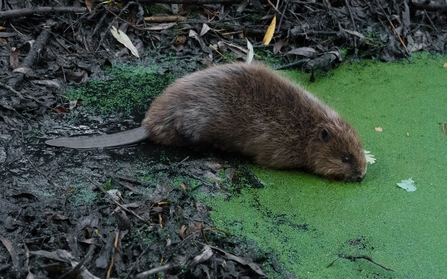
Photo © Kirsty James

Photo © Kirsty James
The Wildlife Trusts are extremely concerned after legal protections for beavers – due to be laid in parliament today – were pulled at the eleventh hour. The decision puts in jeopardy ambitions to see wild beavers return to England, and will have damaging impacts for nature, climate, and communities.
Beavers are key to creating thriving wetland ecosystems – which are critical for climate adaptation –and provide a wealth of benefits for nature and people. A change in legal status would make it an offence to deliberately capture, kill, disturb, or injure beavers, or damage their breeding sites or resting places – without holding the appropriate license. The legislation was scheduled to come into force on 1st October.
Natural England is also developing guidance on the management of beavers, setting out which actions will or will not require a licence, and where people can go for advice.
The Wildlife Trusts are extremely concerned that protections could be abandoned for “nature’s engineers”.
The charities also call for flexible and practical management guidance and – crucially – incentives for landowners to make space for beavers on their land.
A group of beavers introduced into a secure enclosure at Nottinghamshire Wildlife Trust’s largest site – the Idle Valley Nature Reserve near Retford - are already having a beneficial impact for other species by helping to diversify structure of scrub, creating standing deadwood and deadwood in the water.
Adult Beaver at Idle Valley (https://youtu.be/T1f3ND13PAA)
Video of an adult beaver gnawing at a tree at Idle Valley
Clarity around legal protections for beavers are crucial if populations are to recover and thrive long termAli Morse, Water Policy ManagerThe Wildlife Trusts
“Clarity around legal protections for beavers are crucial if populations are to recover and thrive long term – it is extremely disappointing that this legislation has been brought to a juddering holt, with no explanation why. We need to see the widespread return of wild beavers to create vital wetland habitats and restore rivers, many of which have been damaged by centuries of dredging and being cut off from floodplains. As England grapples with a nature and climate emergency, we need our beavers back.”
“Government’s approach to beavers must be ambitious. The licensing guidance should be sensible and pragmatic, supporting landowners, wildlife organisations, communities, and licensing bodies to work together in re-establishing beavers in appropriate locations and providing a much-needed boost to nature.”
Harry Barton, chief executive of Devon Wildlife Trust, says:
"The River Otter Beaver Trial showed what a broad range of benefits beavers can bring to our rivers, wildlife, and people – including improved resilience against flooding and helping landscapes adapt to climate change. Clarifying the legal protection of beavers, which Defra had assured us would be announced during this week of record-breaking temperatures, could have given the opportunity for communities across the country to benefit from these remarkable creatures.”
“Defra must act now and clarify the situation on new legal protections if beavers are to thrive long term. And these protections must work in parallel with practical approaches to management. It is equally important that landowners are given the right support and financial incentives to make space for beavers and the valuable wetland habitats they create. This is the time for action, not delay.”
The Wildlife Trusts are calling on the Government to:
Beavers are a ‘keystone species’ and have a highly positive impact on their environment. The industrious herbivores are native to mainland Britain but were hunted to extinction in the 16th century by people who wanted their fur, meat, and scent glands. The end of beavers led to the loss of the mosaic of lakes, meres, mires, tarns, and boggy places that they were instrumental in creating.
The Wildlife Trusts are at the forefront of beaver reintroductions in the UK and released a record number of beavers in 2021, with seventeen beavers released into fenced areas. This came twenty years after Kent Wildlife Trust brought the first beavers back to Britain at Ham Fen near Sandwich in 2001.
In Scotland and Devon, Wildlife Trusts pioneered licensed trial releases of beavers into the wild, backed by extensive scientific research and strong partnerships, which demonstrated the many benefits of beavers and the most effective tools for managing them. Due to the success of both trials, beavers have been allowed to remain and spread naturally in the River Otter catchment, Devon and in Knapdale, Scotland.
In July 2022, news of beaver kits was announced by Derbyshire, Cheshire and Dorset Wildlife Trusts at enclosed projects on nature reserves. There are now more than 20 wild beaver territories on the River Otter catchment, monitored by Devon Wildlife Trust. Five kits arrived in 2022 to one of the original females in the River Otter Beaver Trial. The Welsh Beaver Project, led by Wildlife Trusts Wales, saw its first kit born at an enclosure on Cors Dyfi nature reserve, Montgomeryshire Wildlife Trust.
For more information on The Wildlife Trusts beaver reintroduction projects, visit their saving species beaver web page here.
For more details and updates about the beavers in Nottinghamshire at our Idle Valley Nature Reserve, read our dedicated web page.